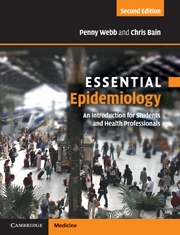Book contents
- Frontmatter
- Contents
- Foreword
- Preface
- 1 Epidemiology is…
- 2 How long is a piece of string? Measuring disease frequency
- 3 Who, what, where and when? Descriptive epidemiology
- 4 Healthy research: study designs for public health
- 5 Why? Linking exposure and disease
- 6 Heads or tails: the role of chance
- 7 All that glitters is not gold: the problem of error
- 8 Muddied waters: the challenge of confounding
- 9 Reading between the lines: reading and writing epidemiological papers
- 10 Who sank the boat? Association and causation
- 11 Assembling the building blocks: reviews and their uses
- 12 Outbreaks, epidemics and clusters
- 13 Watching not waiting: surveillance and epidemiological intelligence
- 14 Prevention: better than cure?
- 15 Early detection: what benefits at what cost?
- 16 A final word…
- Answers to questions
- Appendix 1 Direct standardisation
- Appendix 2 Standard populations
- Appendix 3 Calculating cumulative incidence and lifetime risk from routine data
- Appendix 4 Indirect standardisation
- Appendix 5 Calculating life expectancy from a life table
- Appendix 6 The Mantel-Haenszel method for calculating pooled odds ratios
- Appendix 7 Formulae for calculating confidence intervals for common epidemiological measures
- Glossary
- Index
- References
12 - Outbreaks, epidemics and clusters
- Frontmatter
- Contents
- Foreword
- Preface
- 1 Epidemiology is…
- 2 How long is a piece of string? Measuring disease frequency
- 3 Who, what, where and when? Descriptive epidemiology
- 4 Healthy research: study designs for public health
- 5 Why? Linking exposure and disease
- 6 Heads or tails: the role of chance
- 7 All that glitters is not gold: the problem of error
- 8 Muddied waters: the challenge of confounding
- 9 Reading between the lines: reading and writing epidemiological papers
- 10 Who sank the boat? Association and causation
- 11 Assembling the building blocks: reviews and their uses
- 12 Outbreaks, epidemics and clusters
- 13 Watching not waiting: surveillance and epidemiological intelligence
- 14 Prevention: better than cure?
- 15 Early detection: what benefits at what cost?
- 16 A final word…
- Answers to questions
- Appendix 1 Direct standardisation
- Appendix 2 Standard populations
- Appendix 3 Calculating cumulative incidence and lifetime risk from routine data
- Appendix 4 Indirect standardisation
- Appendix 5 Calculating life expectancy from a life table
- Appendix 6 The Mantel-Haenszel method for calculating pooled odds ratios
- Appendix 7 Formulae for calculating confidence intervals for common epidemiological measures
- Glossary
- Index
- References
Summary
Box 12.1 An unusual epidemic of pneumonia
On the 21st of February 2003, a doctor from southern China visited Hong Kong and stayed one night in a local hotel. Unwell for several days before the trip, he became seriously ill and the next day was admitted to a hospital with severe pneumonia; he died 10 days later. Before admission he had infected numerous people who came into contact with him, including his own family (wife, daughter, sister and brother-in-law) and 16 guests or visitors to the hotel. Some of the hotel guests left Hong Kong for Singapore, Hanoi and Toronto and outbreaks in those areas rapidly followed. Within a month large outbreaks arose in several Hong Kong hospitals, affecting staff, students, patients and visitors. As family members became infected they infected others and the disease began to spread in the community. On the 12th of March 2003, the World Health Organization issued a global alert on atypical pneumonia, called severe acute respiratory syndrome (SARS). By late March a huge outbreak in a Hong Kong housing estate was traced back to a patient discharged from one of the affected hospitals. In Hong Kong there were 1,755 cases and 300 deaths (case fatality rate, CFR = 17%), including 8 fatalities among the 386 health workers affected. The high-rise housing estate had 329 cases and 42 deaths. Hong Kong health authorities quarantined 493 households with 1,262 people, traced 26,520 contacts, and screened 36.3 million travellers. Globally, public health organisations collaborated to identify the organism, devise diagnostic tests, introduce control measures and stop the epidemic by August 2003 after 8,422 cases and 916 deaths worldwide
(Chan-Yeung and Yu, 2003).Information
- Type
- Chapter
- Information
- Essential EpidemiologyAn Introduction for Students and Health Professionals, pp. 276 - 306Publisher: Cambridge University PressPrint publication year: 2010
